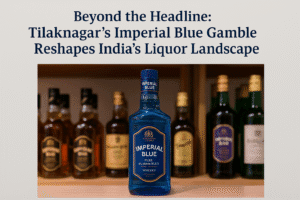Beyond the Headline: Tilaknagar’s Imperial Blue Gamble Reshapes India’s Liquor Landscape
Tilaknagar Industries’ landmark ₹4,150 crore acquisition of Pernod Ricard’s Imperial Blue whisky is a transformative gamble that reshapes India’s liquor landscape. By acquiring the country’s third-largest whisky brand (22.4 million cases annually), the established brandy leader instantly becomes a major force in India’s largest spirits category. This catapults TI’s combined volume past 34 million cases, creating a national powerhouse with vastly expanded distribution reach.
Critically, TI plans to leverage Imperial Blue’s mass-market trust as a launchpad to pursue premium whisky offerings, targeting higher margins. For Pernod Ricard, the sale signifies a strategic retreat from volume to double down on its global premium portfolio. While the deal fast-tracks TI’s pan-India ambitions and competitive scale, its hefty price tag demands significant debt and equity financing, making smooth integration and synergy realization crucial for long-term success against established rivals. This move fundamentally alters the dynamics of the Indian IMFL market.

Beyond the Headline: Tilaknagar’s Imperial Blue Gamble Reshapes India’s Liquor Landscape
The acquisition of Pernod Ricard’s Imperial Blue whisky by Tilaknagar Industries (TI) for ₹4,150 crore isn’t just a record-breaking deal; it’s a seismic shift in India’s fiercely competitive alcoholic beverages market. This move transcends a simple asset purchase – it’s a calculated masterstroke with profound implications for both companies and the industry structure.
Why This Deal Matters Far More Than the Price Tag:
- From Brandy King to Whisky Contender: Overnight, TI transforms from the undisputed leader in Indian brandy (via Mansion House) into a major force in the largest IMFL category: whisky. Imperial Blue, the third-largest whisky by volume in India (22.4 million cases annually), provides instant scale and a trusted, 25-year-old brand heritage TI couldn’t organically replicate for decades. This isn’t just diversification; it’s a strategic leap into the mainstream heart of Indian spirits consumption.
- Pan-India Ambition Realized: TI’s dream of becoming a truly national player gains massive traction. Imperial Blue’s extensive distribution network, spanning owned units and co-manufacturers across India, plugs critical gaps in TI’s reach. Their combined volume rockets to 34 million cases, creating a distribution powerhouse capable of competing head-on with giants like United Spirits and Allied Blenders.
- The Premiumisation Playbook: TI explicitly states Imperial Blue is their “launchpad for a significant whisky premiumisation journey.” This reveals a crucial insight: the deal isn’t just about volume. It’s about acquiring a solid, mass-market brand to serve as a foundation for building higher-margin, premium whisky offerings – a segment experiencing rapid growth fueled by rising disposable incomes and evolving consumer tastes. TI now has the platform and cash flow to chase this lucrative segment.
- Pernod’s Strategic Retreat: Pernod Ricard’s decision to sell a brand generating ₹3,067 crore revenue (FY25) signals a clear strategic pivot. They are shedding a large-volume, mainstream brand to double down on their premium portfolio (Chivas Regal, Absolut, The Glenlivet, etc.). This reflects a global trend among multinationals focusing on higher margins and aspirational segments in emerging markets, conceding the volume battle to deep-pocketed local players better equipped for its complexities.
- Financing the Future: The ₹4,150 crore price tag (including a deferred ₹282 crore payment) is substantial for TI (FY25 Revenue: ₹1,405 Cr; EBITDA: ₹226 Cr). The reliance on a mix of debt and equity highlights both the deal’s significance and the financial strain it entails. Success hinges on TI’s ability to integrate smoothly, realize synergies, and leverage Imperial Blue’s cash flow to fund expansion and premiumisation without overburdening their balance sheet.
The Human Element & Market Ripples:
- Consumer Impact: In the short term, little may change for Imperial Blue drinkers. Long-term, expect TI to innovate – introducing line extensions, limited editions, and eventually, higher-priced whiskies under the Imperial Blue umbrella or new brands, aiming to capture consumers trading up.
- Competitive Pressure: Rivals, especially other Indian whisky majors, face a significantly strengthened competitor. TI now has the brandy and whisky volume to command better shelf space, negotiate harder with retailers, and fund aggressive marketing.
- Regulatory Hurdle: The Competition Commission of India (CCI) approval is the crucial next step. While unlikely to block the deal outright, scrutiny will focus on potential market concentration, especially in specific regions where both players have strong overlap.
The Verdict: A Transformative Gamble
Tilaknagar Industries hasn’t just bought a brand; they’ve bought a transformative future. Acquiring Imperial Blue catapults them into the big leagues of Indian spirits, providing instant scale in whisky, nationwide reach, and a platform for profitable premium growth. However, the hefty price tag and integration challenge represent significant risks. Pernod Ricard, conversely, sharpens its focus on the premium end, betting on long-term margins over volume dominance.
This deal is a defining moment. If TI executes effectively, leveraging Imperial Blue’s strength while navigating the financial and operational complexities, they emerge as India’s most formidable homegrown spirits conglomerate. If they stumble, the burden of debt and integration could prove costly. One thing is certain: the landscape of India’s IMFL market just got dramatically more interesting.
You must be logged in to post a comment.